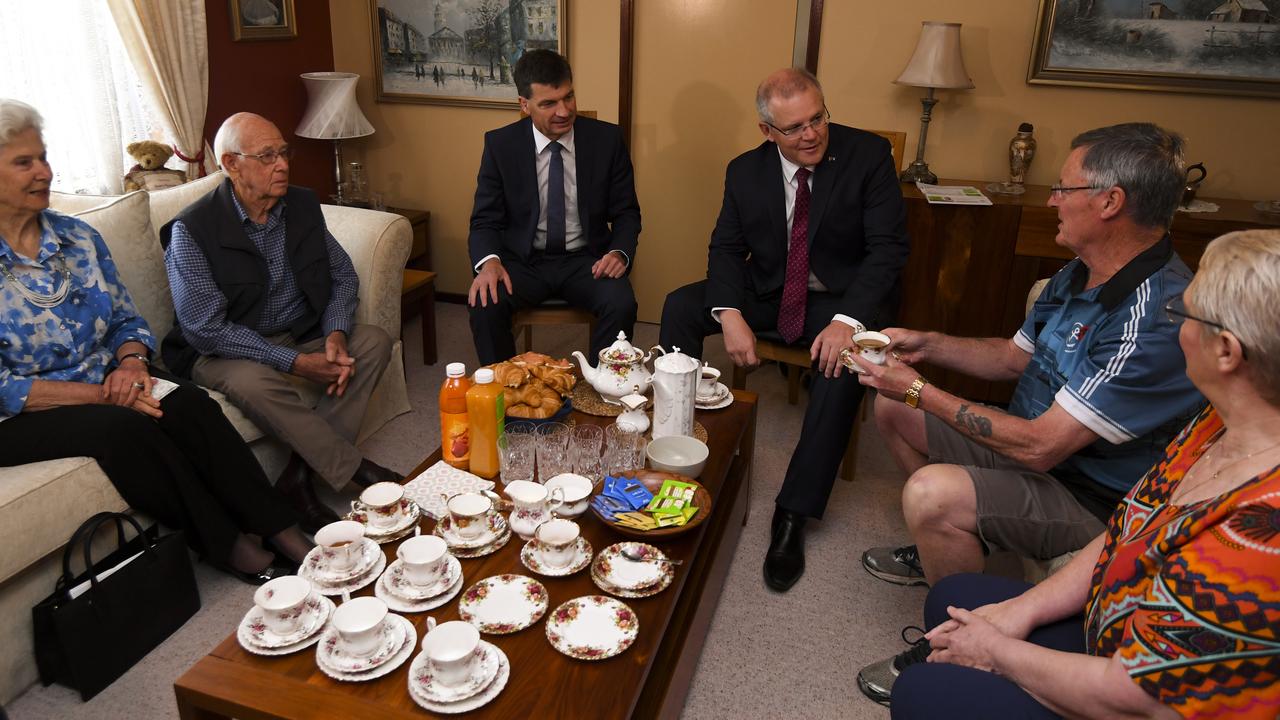Scott Morrison to crack down on energy companies as climate change concerns grow
LOOKS like we’ll have to wait until next year for measures announced by Scott Morrison to slash electricity bills to take effect.
A CRACKDOWN on big energy companies has been announced today in a bid to slash power bills but consumers will have to wait until next year to benefit.
Prime Minister Scott Morrison and Energy Minister Angus Taylor have revealed measures to address energy prices and reliability.
It’s hoped the changes will get rid of the “loyalty tax” consumers pay if they don’t actively compare prices and reconsider their contracts regularly.
The Australian Energy Regulator will introduce a “price safety net”, which involves power retailers setting their prices against a default market price. This was a measure recommended by the Australian Competition and Consumer Commission’s (ACCC) inquiry into retail power prices.
It could help households save hundreds of dollars, and businesses thousands.
“The default offer will ensure customers are not being exploited by being loyal to a service provider,” Mr Taylor said.
The AER will introduce a default price by 30 April, 2019 and savings are expected to be passed through to families and small businesses by 1 July, 2019.
The Australian Energy Market Commission found that customers on standing offers could be paying up to $832 per year more than the cheapest market offer in some regions. Small businesses could be paying up to $3,457 per year in higher electricity costs.
Other measures include:
Price gouging: Banning late payment penalties and forcing energy retailers to pass on wholesale prices to customers. The regulator will get greater powers to crack down on dodgy practices including through fines, penalties, enforceable undertakings, structural separation and divestiture.
Investment in new generation: Help the construction of new sources of energy generation through the Underwriting New Generation Investments program. Submissions open on 9 November on how the program should be structured. Then an expression of interest process will be open from December 2018 until January 2019.
Reliable power: Energy companies will be required to sign contracts guaranteeing enough energy to meet demand. The Federal Government will work with state and territory governments to ensure these contracts are signed.
The government will also develop legislation for monitoring of electricity prices and this will include getting recommendations from the ACCC for enforcement remedies and empowering the Treasurer to divest assets if the ACCC recommends.
The COAG Energy Council, which includes representatives from state and federal governments, will be encouraged to cap how many energy assets companies can own, make wholesale energy contracts more transparent, introduce higher penalties of up to $10 million for breaches of the National Electricity Law and increase the AER’s powers to investigate market manipulation and impose remedies.
The Morrison Government is under pressure to act on energy policy after the disastrous result in the Wentworth by-election saw it lose the blue ribbon seat held by the former prime minister Malcolm Turnbull.
Mr Morrison dumped the Coalition’s energy plan, the National Energy Guarantee (NEG) after Mr Turnbull was ousted but said his Government’s focus would be on bringing down prices.

The ACCC found electricity customers in South Australia were paying up to $832 per year more if they were on a standing offer compared to the cheapest market offer. In Victoria they were paying $652 more, in NSW it was $411 more, Queensland $369 more and ACT $273 more. Tasmania already has a regulated standing offer.
Setting a default price for electricity will help customers compare offers and should help bring down prices.
Each region will also get a reference bill that retailers will have to calculate their discounts against so customers can get a better idea of how good the deal is.
Mr Taylor will meet with state and territory ministers in Sydney on Friday to discuss the changes.
Meanwhile, moderates within the Liberal Party are reportedly so concerned about the Government’s direction on climate policy they are about to demand $1 billion be put into the Emissions Reduction Fund.
The Australian Financial Review reported there is growing unrest within the Liberal Party on the issue, especially after the disastrous Wentworth by-election.
The Coalition has already said it will not go back to the NEG, and moderates are concerned about Australia meeting its 2030 Paris Agreement targets.
Recent reporting shows Australia’s greenhouse gas emissions have climbed 1.3 per cent to their highest levels in eight years.
The interim results of an exit poll after the Wentworth by-election commissioned by the Australia Institute and undertaken by Lonergan Research, shows concern about the Government’s support for coal and inaction on climate change influenced many people’s vote.
According to the poll of 1049 voters in Wentworth, 78 per cent said climate change and replacing coal with renewables had some influence on their vote and 33 per cent named it as the most important issue.
It comes as a special report from the Intergovernmental Panel on Climate Change noted that if the world’s temperature warmed by 2C, almost all the world’s coral reefs would be lost from 2050, including the Great Barrier Reef.
The world has already warmed by about 1C above pre-industrial levels and is likely to reach 1.5C between 2030 and 2052 if it continues to increase at the current rate.
But the report makes clear that keeping warming to a 1.5C limit would be very difficult and cannot be achieved without removing carbon dioxide from the atmosphere.
The longer governments wait to act, the harder and more expensive the task will be.
Four scenarios were examined to reach the 1.5C target and all of them include a dramatic reduction in the use of coal for electricity generation to practically zero per cent by 2050.
The scenarios also require carbon dioxide removal, changes to agriculture and forestry land use, as well as bioenergy with carbon capture and storage.
— with AAP




